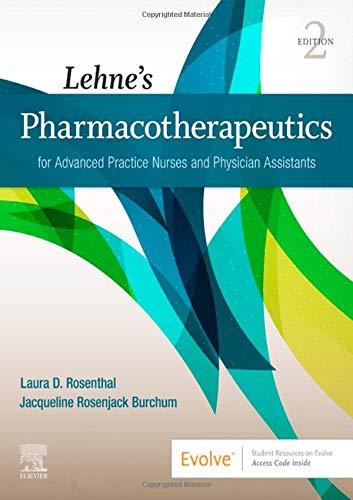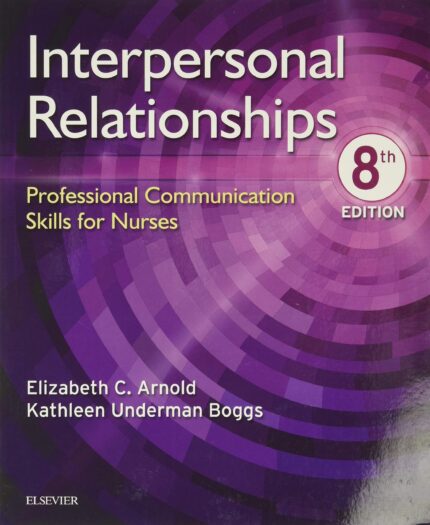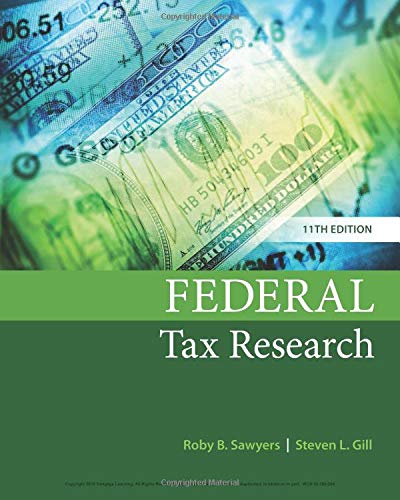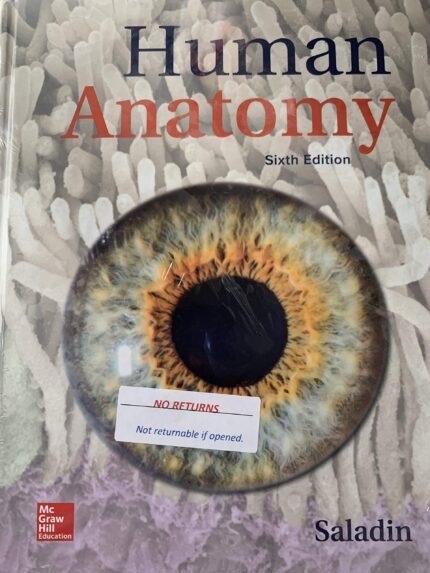Test Bank For Lehne’s Pharmacotherapeutics for Advanced Practice Nurses and Physician Assistants 2nd Edition Rosen
Test Bank For Lehne’s Pharmacotherapeutics for Advanced Practice Nurses and Physician Assistants 2nd Edition Rosen
Lehne’s Pharmacotherapeutics for Advanced Practice Nurses and Physician Assistants 2nd Edition Rosen
Test Bank For Lehne’s Pharmacotherapeutics for Advanced Practice Nurses and Physician Assistants
Lehne’s Pharmacotherapeutics for Advanced Practice Nurses
Chapter 1: Prescriptive Authority
Multiple Choice
1. An APRN works in a urology clinic under the supervision of a physician who does not restrict
the types of medications the APRN is allowed to prescribe. State law does not require the
APRN to practice under physician supervision. How would the APRN’s prescriptive authority
be described?
a. Full authority
b. Independent
c. Without limitation
d. Limited authority
ANS: B
The APRN has independent prescriptive authority because the regulating body does not require
that the APRN work under physician supervision. Full prescriptive authority gives the provider
the right to prescribe independently and without limitation. Limited authority places restrictions
on the types of drugs that can be prescribed.DIF: Cognitive Level: ComprehensionREF: p. 1TOP:
Nursing Process: I MSC: NCLEX Client Needs Category: Physiologic Integrity: Pharmacologic
and Parenteral Therapies
2. Which factors increase the need for APRNs to have full prescriptive authority?
a. More patients will have access to health care.
b. Enrollment in medical schools is predicted to decrease.
c. Physician’s assistants are being utilized less often.
d. APRN education is more complex than education for physicians.
ANS: A
Implementation of the Affordable Care Act has increased the number of individuals with health
care coverage, and thus the number who have access to health care services. The increase in the
number of patients creates the need for more providers with prescriptive authority. APRNs can fill this practice gap.DIF: Cognitive Level: ComprehensionREF: p. 2TOP: Nursing Process:
Implementation MSC: NCLEX Client Needs Category: Physiologic Integrity: Pharmacologic and
Parenteral Therapies
3. Which factors could be attributed to limited prescriptive authority for APRNs?
Select all that apply.
a. Inaccessibility of patient care
b. Higher health care costs
c. Higher quality medical treatment
d. Improved collaborative care
e. Enhanced health literacy
ANS: A , B
Limiting prescriptive authority for APRNs can create barriers to quality, affordable, and accessible
patient care. It may also lead to poor collaboration among providers and higher health care costs.
It would not directly impact patient’s health literacy.DIF: Cognitive Level: ComprehensionREF:
p. 2TOP: Nursing Process: Implementation MSC: NCLEX Client Needs Category: Physiologic
Integrity: Pharmacologic and Parenteral Therapies
4. Which aspects support the APRN’s provision for full prescriptive authority?
Select all that apply.
a. Clinical education includes prescription of medications and disease processes.
b. Federal regulations support the provision of full authority for APRNs.
c. National examinations provide validation of the APRN’s ability to provide safecare.
d. Licensure ensures compliance with health care and safetystandards.
e. Limiting provision can decrease health care affordability.
ANS: A , C , D
APRNs are educated to practice and prescribe independently without supervision. National
examinations validate the ability to provide safe and competent care. Licensure ensures
compliance with standards to promote public health and safety. Limited prescriptive authority
creates numerous barriers to quality, affordable, and accessible patient care.DIF: Cognitive Level:
ComprehensionREF: pp. 1-2TOP: Nursing Process: Implementation MSC: NCLEX Client Needs
Category: Physiologic Integrity: Pharmacologic and Parenteral Therapies
5. Which aspects support the APRN’s provision for full prescriptive authority?
Select all that apply.
a. Clinical education includes prescription of medications and disease processes.
b. Federal regulations support the provision of full authority for APRNs.
c. National examinations provide validation of the APRN’s ability to provide safecare.
d. Licensure ensures compliance with health care and safety standards.
ANS: A , C , D
APRNs are educated to practice and prescribe independently without supervision. National
examinations validate the ability to provide safe and competent care. Licensure ensures
compliance with standards to promote public health and safety. Limited prescriptive authority
creates numerous barriersto quality, affordable, and accessible patient care.DIF: Cognitive Level:
ComprehensionREF: pp. 1-2TOP: Nursing Process: Implementation MSC: NCLEX Client
Needs Category: Physiologic Integrity: Pharmacologic and Parenteral Therapies
6. A family nurse practitioner practicing in Maine is hired at a practice across state lines in
Virginia. Which aspect of practice may change for the APRN?
a. The APRN will have less prescriptive authority in the new position.
b. The APRN will have more prescriptive authority in the new position.
c. The APRN will have equal prescriptive authority in the newposition.
d. The APRN’s authority will depend on federalregulations.
ANS: A
Virginia allows limited prescriptive authority, while Maine gives full authority to certified nurse
practitioners. The federal government does not regulate prescriptive authority.DIF: Cognitive
Level: ComprehensionREF: p. 3TOP: Nursing Process: Implementation MSC: NCLEX Client
Needs Category: Physiologic Integrity: Pharmacologic and Parenteral Therapies













